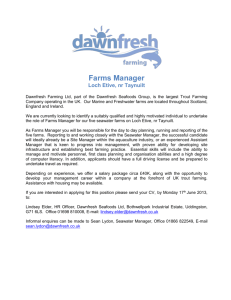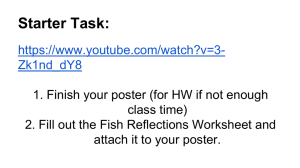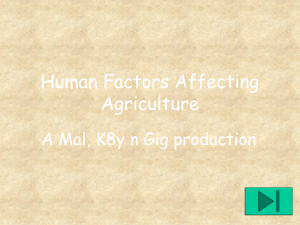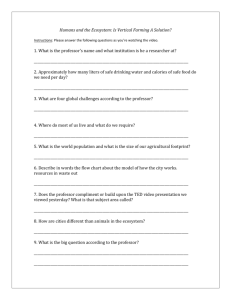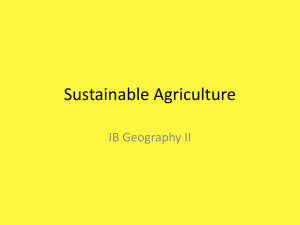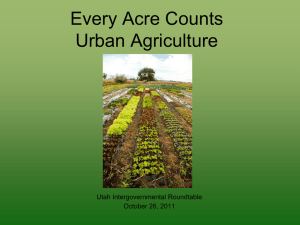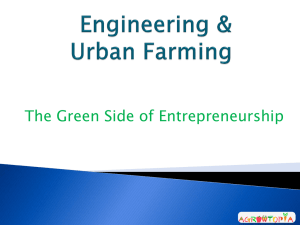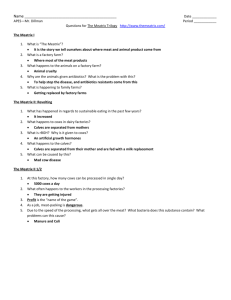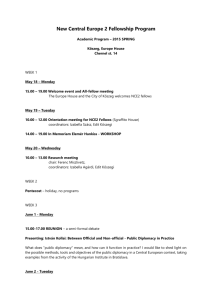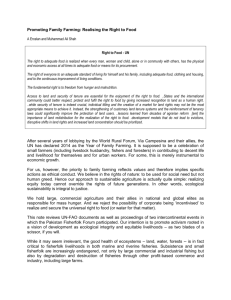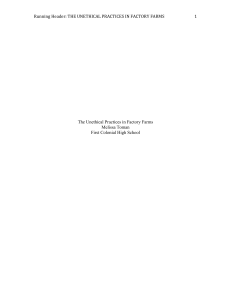LCS122 assessment
advertisement
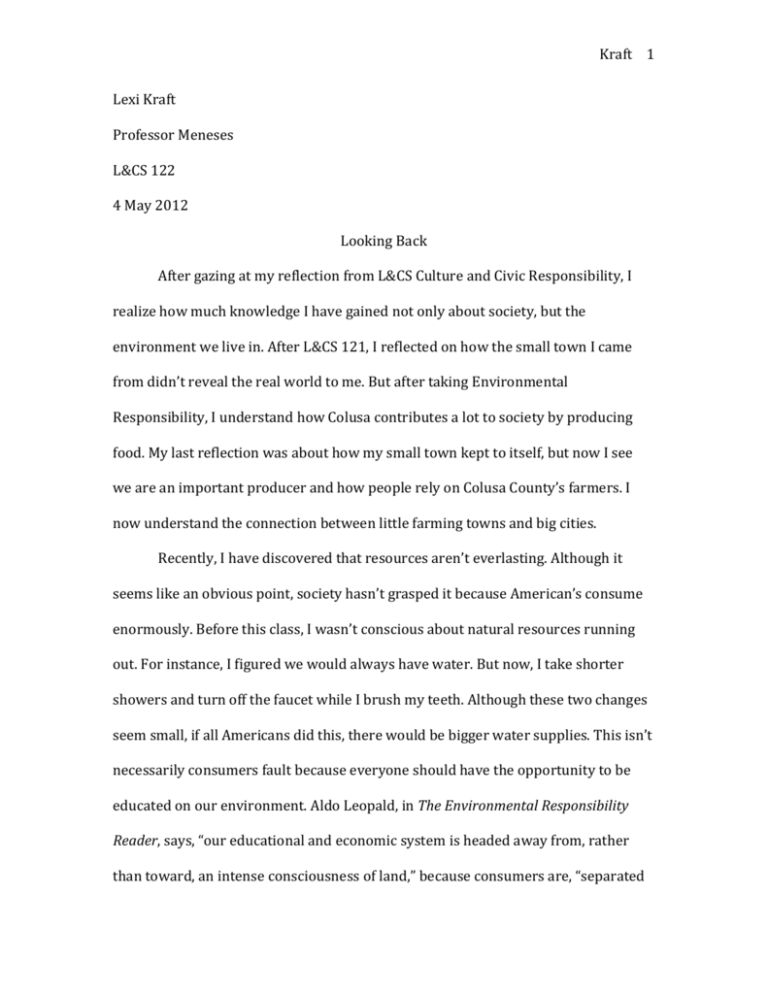
Kraft 1 Lexi Kraft Professor Meneses L&CS 122 4 May 2012 Looking Back After gazing at my reflection from L&CS Culture and Civic Responsibility, I realize how much knowledge I have gained not only about society, but the environment we live in. After L&CS 121, I reflected on how the small town I came from didn’t reveal the real world to me. But after taking Environmental Responsibility, I understand how Colusa contributes a lot to society by producing food. My last reflection was about how my small town kept to itself, but now I see we are an important producer and how people rely on Colusa County’s farmers. I now understand the connection between little farming towns and big cities. Recently, I have discovered that resources aren’t everlasting. Although it seems like an obvious point, society hasn’t grasped it because American’s consume enormously. Before this class, I wasn’t conscious about natural resources running out. For instance, I figured we would always have water. But now, I take shorter showers and turn off the faucet while I brush my teeth. Although these two changes seem small, if all Americans did this, there would be bigger water supplies. This isn’t necessarily consumers fault because everyone should have the opportunity to be educated on our environment. Aldo Leopald, in The Environmental Responsibility Reader, says, “our educational and economic system is headed away from, rather than toward, an intense consciousness of land,” because consumers are, “separated Kraft 2 from the land by many middlemen, and by innumerable physical gadgets,” (25). If I didn’t take this class, I wouldn’t care about how our society doesn’t have the ability to be educated on the land we live on. Now, it makes me mad how ignorant society is and how it is out of control. To save our natural resources, we need to only take what we need, instead of what we want, unless we want to ruin our planet. Because our resources are limited, we need to promote that issue as a society by not having such easy access to so many products. Factories that are putting family farms out of business shouldn’t be supported because they are secretive about their product life spans, using chemicals and/or pesticides that aren’t listed on their label, and making underdeveloped countries. Since they are available at any grocery store at low costs, people are willing to buy them. Farmers markets are more expensive and not as convenient. Grocery stores should support their local farmers instead of outsourcing to cheaper solutions. Instead of supporting this, consumers should educate themselves on family farms in their area and buy as much food from them as they can. Although these farms and farmers markets are more expensive, food is essential to our living and if we continue buying industrialized foods, later on in lives bigger bills for sicknesses may occur or lives may be cost. Family farms are more open about the process of their crops because they typically have nothing to hide. In life, we typically get out what we put into things. For example, if you put in a lot of effort to a certain class, you’ll get a good grade out of it. I learned that food is the same way. Consumers are settling for factory processed food because it is cheap and easy to get to. This means, they are getting bad food out of the factory farms’ Kraft 3 production. Fruits and vegetables appear to be plumper and more colorful because factories use chemicals that aren’t beneficial to human health, only to the eye. If we spray pesticides that serve as steroids on produce, they will go into our bodies. Animals are also being slaughtered profoundly and are forced to live quicker lives because of the humans’ obsession with wanting more and more food. If we cheat our animals before they are slaughtered, the result, which is the meat, will also be cheated. Micheal Pollan reveals, through Omnivore’s Dilemma, “Cows raised on grass simply take longer to reach slaughter weight than cows raised on a richer diet,” and now instead of cows living four or five years to reach slaughter weight, steers go from “80 to 1,100 pounds in fourteen months,” due to “tremendous quantities of corn, protein and fat supplements, and an arsenal of new drugs,” (71). Before this class, I didn’t know humans would resort to such an inhumane process in order to get meat. With meat being produced that fast, it is nearly impossible to go back to the older farming ways because society desires quantity over quality. Americans also tend to cater to newer ideas, which makes factory farms even more appealing. Cows are an extreme example of how industrialized farming has selfishly twisted and tricked nature. We have cows all over my hometown, and our college. Now when I see them I get sad because of the short life they are bound to live. This process is not only unfair to the cows, but also to the farmers who oppose this process and are losing business because they can’t keep up with factory farming. After grasping all this new information, I believe the government needs to set higher standards when it comes to regulating food. I used to trust our government, but now with the new insights I have attained I think they are only adding on to our Kraft 4 environmental and social issues. Before buying the usual junk food I used to buy, I read the label and turn down many foods I once enjoyed. Because government isn’t regulating our food production correctly, Consumers are disconnected which makes it hard to know what we are buying. This class has made me more aware of all the issues we face everyday; before Environmental Responsibility I was blind. This class brought many agricultural issues to my attention that really sparked my interest. I enjoyed learning about advancements in farming because I come from an agricultural based town. A ranch has been in my family since 1944, which made it easy to relate readings and agricultural issues to my personal feelings. Since I found myself researching agricultural issues in Colusa in my free time, I decided to create my minor so I can pursue a career in not only teaching, but also in farming. Before this semester, my minor was history, which I dreaded because it didn’t appeal to me. After a lot of hard work, Saint Mary’s College has approved my created minor of Business Agriculture. With this minor, I plan to go back to my family’s ranch and help out with the business portion of it. L&CS 122 has encouraged me to follow through with my passion for agriculture. It has offered me information and problems that surround my family’s ranch that I wasn’t interested in before. At grocery stores, I think twice before I buy nuts and rice, because I know my family is working hard producing the same crops. My mom and I buy these products from my grand parents because they need more support to stay in business. This class has encouraged me to help my family’s farm fight against the factory farms that are gaining support. Kraft 5 People like my grand parents who farm deserve more money, respect, and land compared to the industrial farms. With my minor classes I am taking through summer school, I hope to become more educated on farming issues because I will be facing them in the future. By taking this Environmental Responsibility class, I was able to reconnect with my passion for agriculture that slowly faded away once I got into college, which makes me more confident and determined to be successful through my education. Through my service-learning experience in the SMC Legacy Garden, I have gained even more respect for farmers and other people who produce food. It takes a lot of hard work, dedication, and time to successfully grow food, and my time at the garden showed me that. Julia, the supervisor of the garden, taught me how you have to be dedicated to the land to see results. I will take what I learned from her back home to my family’s ranch to help it succeed. My hands on experience with planting tomatoes, pulling weeds, and picking different foods to eat showed me how fun hard work can be. After college, I plan to have my own garden so I can be sure of where my fruits and vegetables come from. Although the Environmental Responsibility class and service hours have came to an end, I will carry what I learned forever, especially with future in agriculture. The problems I learned about have affected my everyday life and I often catch myself spreading the word to my friends and family. Without this class, I would be unaware of problems my family’s ranch faces, clueless that our natural resources have the ability to run out, and be forcing myself to take boring history Kraft 6 classes. I have a better idea of who I am after taking L&CS 122 not only a student, but as a future farmer and teacher.

